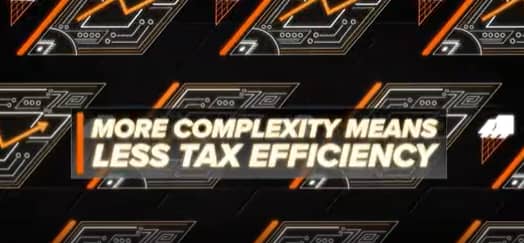ETF Edge explains: Tax risks of ETFs

Along with low costs and low risks, most exchange-traded funds are more tax efficient than their costlier counterparts: traditional mutual funds. But in some cases, ETFs lose their tax advantage and may end up costing you more in the future. Here’s how and why.
All investments are subject to capital gains taxes. Capital gains are pretty simple. If you buy a security, like a stock, and you sell that security for more than you bought it, Uncle Sam is going to want a slice of that.
It’s important to note that from the perspective of the IRS, ETFs and mutual funds are the same and therefore subject to capital gains tax when they sell a position that generates again. There are long-term capital gains (if the security was held for more than a year) and short-term capital gains (if it was held for less than a year).
The majority of ETFs are more tax-efficient than mutual funds because ETFs are able to defer capital gains through a process called creation and redemption.
Dave Nadig of ETF Trends says to think about the creation/redemption process as a washing machine. In this process, market makers buy and sell the underlying securities to create and redeem shares of ETFs. These do not create a taxable event.
More from ETF Edge:
ETF Edge explains: Why are ETFs so appealing to investors
Warren Buffett buys into Japanese stocks. How to play the moves using ETFs
An ETF for SPACs: Unpacking Defiance’s upcoming product
Furthermore, ETFs are almost always passively managed. Passive means less trading, and thus fewer opportunities to generate any internal taxable gains in the first place.
However, when investors decide they want more than these plain-vanilla options, complexity follows and ETFs start to become less tax efficient.
For instance, if you hold the SPDR GLD ETF, an ETF that tracks the price of gold in London banks, you’ll be taxed on the physical gold in the vault. Because the IRS views physical gold as a collectible, you get hit with a 28% tax when you sell, no matter how long you hold it, the same as if you held bullion or a mutual fund tracking gold.
ETFs that track illiquid underlying securities, like junk bonds or emerging markets, may not be able to use the redemption trick, because the fund functions better when redemptions are handled in cash.
And ETFs that use derivatives like commodity futures may also be less tax efficient than other ETFs as they get marked to market every day, and taxed at a blended rate.
You may have noticed a pattern by now.
When investors move past traditional ETFs and start investing in more complex funds they lose a key advantage of the ETFs — tax efficiency. Bottom line — keep it simple.




